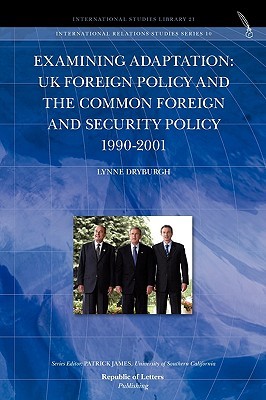
- We will send in 10–14 business days.
- Author: Lynne Dryburgh
- Publisher: Republic of Letters
- Year: 2010
- Pages: 312
- ISBN-10: 9089790438
- ISBN-13: 9789089790439
- Format: 15.6 x 23.4 x 1.7 cm, softcover
- Language: English
- SAVE -10% with code: EXTRA
Reviews
Description
Recent years have seen the publication of several analyses of the relationship between EU foreign, security and defence policies and those of the minor member states. Although varied in their conclusions on the impact on the minor member states, they are united in one assumption: that the effects of EU-level developments will be fewer amongst the major member states than amongst the minor ones. This analysis subjects that assumption to detailed empirical investigation through a case-study of the United Kingdom. The resulting analysis provides fresh insights into the relationship of the UK with EU foreign, security and defence policy developments which challenges this common assumption, and offers an innovative analytical framework, offering fresh understandings of the adaptation process. International Relations Studies Series, 10 (International Studies Library, 21) Table of Contents Introduction Chapter One: Understanding Adaptation: Analytical Framework and Methodology Chapter Two: Setting the Scene: CFSP, ESDP and UK National Colours Chapter Three: British Adaptation to the Institutional Development of the Common Foreign and Security Policy Chapter Four: British Adaptation to the Institutional Development of the European Security and Defence Policy Chapter Five: British Adaptation to the European Union's Policy towards Cuba Chapter Six: British Adaptation to the Policy of the European Union towards Iran Conclusion Bibliography Index About the Author Lynne Dryburgh, Ph.D. (2006) in International Politics, University of Wales, Aberystwyth is a Lecturer in Defence Studies at King's College London. She has published on the EU as a Global Actor and on EU foreign, security and defence policies.
EXTRA 10 % discount with code: EXTRA
The promotion ends in 20d.23:50:46
The discount code is valid when purchasing from 10 €. Discounts do not stack.
- Author: Lynne Dryburgh
- Publisher: Republic of Letters
- Year: 2010
- Pages: 312
- ISBN-10: 9089790438
- ISBN-13: 9789089790439
- Format: 15.6 x 23.4 x 1.7 cm, softcover
- Language: English English
Recent years have seen the publication of several analyses of the relationship between EU foreign, security and defence policies and those of the minor member states. Although varied in their conclusions on the impact on the minor member states, they are united in one assumption: that the effects of EU-level developments will be fewer amongst the major member states than amongst the minor ones. This analysis subjects that assumption to detailed empirical investigation through a case-study of the United Kingdom. The resulting analysis provides fresh insights into the relationship of the UK with EU foreign, security and defence policy developments which challenges this common assumption, and offers an innovative analytical framework, offering fresh understandings of the adaptation process. International Relations Studies Series, 10 (International Studies Library, 21) Table of Contents Introduction Chapter One: Understanding Adaptation: Analytical Framework and Methodology Chapter Two: Setting the Scene: CFSP, ESDP and UK National Colours Chapter Three: British Adaptation to the Institutional Development of the Common Foreign and Security Policy Chapter Four: British Adaptation to the Institutional Development of the European Security and Defence Policy Chapter Five: British Adaptation to the European Union's Policy towards Cuba Chapter Six: British Adaptation to the Policy of the European Union towards Iran Conclusion Bibliography Index About the Author Lynne Dryburgh, Ph.D. (2006) in International Politics, University of Wales, Aberystwyth is a Lecturer in Defence Studies at King's College London. She has published on the EU as a Global Actor and on EU foreign, security and defence policies.


Reviews